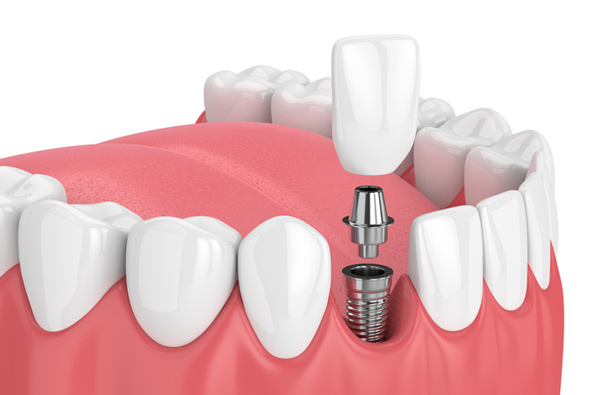What Risks Are Associated with Implants?
Charlotte, N.C.
 Dental implants are a common and practical way to replace lost teeth. They provide a strong and aesthetically pleasing substitute for bridges and dentures. However, even with their high success rate, patients should be informed of the dangers and potential difficulties associated with dental implants, prior to undertaking the treatment. Dental implants are a common and practical way to replace lost teeth. They provide a strong and aesthetically pleasing substitute for bridges and dentures. However, even with their high success rate, patients should be informed of the dangers and potential difficulties associated with dental implants, prior to undertaking the treatment.
Common Risks and Adverse Events
Dental implant treatments are typically safe. However, patients should be aware of the risks and possible negative outcomes.
Infection
One of the most typical issues related to dental implants is infection at the implant site. Infections can damage the surrounding gum and bone tissue and can happen after or during surgery. Swelling, discomfort, redness, and discharge from the implant site are indicators of infection. If the infection is severe, the implant may need to be removed, and further antibiotic therapy may be necessary.
Nerve Damage
If the implant is positioned too near a nerve, especially in the lower jaw, nerve damage may happen. This may lead to numbness in the chin, gums, and lips, tingling, or discomfort. That said, nerve injury is usually irreversible.
Sinus Issues
If an implant protrudes into the sinus canal after being implanted in the upper jaw, sinus issues might occur. Sinus infections, pain, and other possible side effects that could necessitate further surgery might result from such a thing.
Implant Failure
If the bone fuses with the implant, this can result in implant failure. Several factors, such as poor bone quality, insufficient healing time, severe implant stress, and certain medical disorders like diabetes, can lead to implant failure.
Peri-Implantitis
Inflammation of the gums and surrounding bone around implants is known as peri-implantitis. It is comparable to periodontitis. However, if left untreated, it can result in implant failure and loss of supporting bone. While good oral hygiene can prevent this issue, you can opt for a routine dental examination for treatment if you're diagnosed with this condition.
Additional Surgeries
Even though dental implants are meant to be a permanent solution, more procedures can be required to guarantee their effectiveness and handle any issues that may develop over time.
Implant Removal
An implant may occasionally need to be removed because of a serious infection, failure, or other issues. After implant removal, there is usually a healing phase.
Revision Surgery
If an implant fails or if issues such as implant malposition, peri-implantitis, or cosmetic concerns arise, revision surgery may be required. During revision surgery, the failed implant may be removed, any infections or inflammation may be treated, and a new implant may be placed once sufficient healing has occurred.
Sinus Lift
An upper jaw implant may require a sinus lift if there is insufficient bone height in the sinus region. This surgery includes growing bone beneath the sinus. It is usually done to provide a solid base for the implant.
Bone Grafting
To make sure there is enough bone to support the implant, patients may occasionally need to have bone grafting done before the implant is placed. Bone grafting includes implanting bone or materials that resemble bone.
Implant Complications
There are some issues related to dental implants that might affect their durability. These include:
Implant Overload
Excessive stress applied to an implant can cause implant overload. This can cause implant failure and bone loss. Such a thing happens when there are insufficient implants to support the prosthetic teeth. Implant overload also happens if the implant is not positioned correctly or there are problems with the bite alignment.
Aesthetic Complications
Aesthetic concerns can also impact the appearance of the implant and the surrounding tissues. These might include the prosthetic tooth's mismatched color or form, gum recession, and implant components showing through. This can require further treatments, including soft tissue grafting or prosthetic crown modifications, to address cosmetic problems.
Mechanical Complications
Abutments and crowns are parts of the implant system that may experience mechanical issues. Abutment loosening, abutment or implant fractures, and wear or damage to the prosthetic crown are a few examples of these problems. Regular dental checkups are necessary to monitor the implant's health and quickly resolve mechanical issues.
Reports of Squamous Cell Carcinoma (SCC), Various Lymphomas other than BIA-ALCL, and Mesenchymal Tumors, including Sarcoma
Sarcoma and other mesenchymal tumors, as well as many lymphomas and Squamous Cell Carcinoma (SCC), have been linked to dental implants. Here are more details on such health issues:
Mesenchymal Tumors and Sarcoma
Sarcoma and other mesenchymal tumors are uncommon malignancies that develop in the connective tissues. That said, very few cases of mesenchymal malignancies around dental implant sites have been reported. The precise reason is unknown, like with other major health issues, although potential contributors include genetic predisposition and chronic inflammation. Managing these uncommon but dangerous illnesses depends heavily on early discovery and treatment.
Lymphomas
There have been sporadic instances of non-Hodgkin lymphoma and other lymphomas related to dental implants. The link between lymphoma and dental implants is not well established, and these instances are incredibly uncommon. Nevertheless, before having dental implant surgery, you should talk with your dentist about any possible concerns. This is especially the case for people with a history of lymphoma or other malignancies.
Squamous Cell Carcinoma (SCC)
Oral cavity Squamous Cell Carcinoma (SCC) is a kind of skin cancer that can potentially happen. However, there have been isolated occurrences of SCC developing around dental implants. The precise origin of SCC is unknown. However, it is suggested by doctors that trauma, infection, or persistent inflammation at the implant site may be risk factors.
Book Your Appointment Today!
When it comes to function and appearance, dental implants are a very popular and successful method for replacing lost teeth. However, they do not come without dangers or possible difficulties. When choosing dental implants, patients should be thoroughly educated about the potential hazards and common risks, the chance of needing future procedures, problems related to the implant, and the uncommon but potentially dangerous health issues such mesenchymal tumors, different lymphomas, and squamous cell carcinoma (SCC).
For more information about dental implants and associated issues, visit Myers Park Dental Partners today. Our dental staff are highly skilled and will select the best possible course of action for your dental needs. Schedule your appointment today by calling us at (704) 332-2532. |
